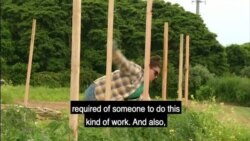On a recent day, Layton Guenther took a break from work to talk about moving from a wealthy neighborhood near New York City to a farm on Long Island.
“Farming - for where I grew up - was a very unusual career choice,” said the 32-year-old American. But “everybody belongs on the land in their own way. None of us should feel alienated from it.”
Layton Guenther, who is non-binary, identifies with the pronouns “they,” “their” and “them” instead of “he” or “she.”
Gunther was raised in an upper middle class town outside New York, where most people never think about working on a farm.
Today, Guenther grows potatoes, squash, wheat and other crops at Quail Hill, a property in Amagansett, New York.
Guenther is part of a growing number of non-binary, college educated Americans in their 20s and 30s who are changing the face of organic farming.
In the same town, Amanda Merrow and Katie Baldwin operate another farm called Amber Waves. The two met at an apprenticeship program. Merrow said she had registered for the training “with the intention of doing something else after.” But she fell in love with farming and says she could not imagine doing anything else.
In the United States, organic farming is a growing, $50 billion industry. Organically grown food is made and processed with no manmade fertilizers or pesticide products.
Women and non-binary people operate some of the best-known organic farms on Long Island. Women make up a little more than 37 percent of all organic farmers nationwide. They represent 36 percent of all commercial farmers. That information comes from the U.S. Department of Agriculture. Experts predict women’s share in farming is likely to continue to grow.
There is no information on the share of transgender farmers across the country.
HB Lozito says the number of transgender farmers is growing. Lozito is executive director of Out in the Open, an organization that connects rural LGBTQ people.
One reason organic farms are more diverse on gender is that their smaller size means less money is needed to support them. This makes them popular among new farmers, said Sophie Ackoff. She is vice president of policy and campaigns at the National Young Farmers Coalition.
The average organic farm is about 141 hectares compared to 178 hectares for a commercial farm. That information also comes from the USDA.
These groups, and new young farmers, chose organic farming because of their desire to have an influence on society, Ackoff and several farmers said.
She said that they are choosing it “to protect natural resources for future generations, to fight climate change, to feed their community good, [and] healthy food.”
Many are working in New York State, where organic farming is growing two times as fast as the national average.
New York has more than 1,000 certified organic farms, making it the third largest in the country. California and Wisconsin are first and second, the USDA says. These farms make up nearly four percent of the state’s farmland, compared with a national average of around 0.6 percent.
Although organic farming is growing quickly, it comes with high labor costs and sometimes smaller harvests than commercial farming. So it can be a difficult business for new farmers.
“When I look now at the starting of the farm, it seems really audacious,” Katie Baldwin said. “But in that environment, in 2008, everybody had lost their jobs and there weren’t jobs.” So, it didn’t feel strange to start something, she said.
At Amber Waves, Baldwin and Merrow grow vegetables, wheat, and herbs on about eight hectares of farmland. And just like Quail Hill, Amber Waves trains people in farming. They are the next generation of diverse farmers, new to agriculture and happy about the farms’ gender-diverse leadership.
I’m Jill Robbins.
Ayenat Mersie reported this story for the Reuters news agency. Alice Bryant adapted the report for VOA Learning English. George Grow was the editor.
_____________________________________________________________
Words in This Story
non-binary – n. people who do not identify themselves as being just a man or a woman
alienated – v. causing someone to feel set apart or estranged
intention – n. a plan or aim
commercial – adj. making or designed to make a profit
transgender – adj. relating to a person whose sense of personal identity and gender is not related to their sex at birth
LGBTQ – n. a term meaning lesbian, gay bisexual, transgender and queer
diverse – n. very different
resource – n. money, materials and other things that are required to make something operate effectively
certified – adj. officially recognized as meeting a set of rules
audacious – adj. a willingness to lake risks





